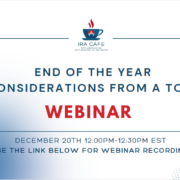Self-Directed IRA Tips
We’d like to take this opportunity to remind readers about how to get the most out of their Self-Directed IRA and other self-directed investments. While most people who regularly use Self-Directed IRAs know the rules and stay in compliance, the IRS disallows a few IRAs every year because people either didn’t know the basic rules concerning Self-Directed IRAs, or attempted to abuse them for personal gain, rather than use the IRAs for the purpose Congress intended.
- Know the disqualified person rules. Your Self-Directed IRA cannot do business with you, your spouse, parents, grandparents, child, grandchild or those of your spouse. The same goes for any corporation or other entities they control.
- Don’t mix personal and IRA funds. If you have a property in a real estate IRA, handle all repairs, maintenance, upgrades and other expenses using funds from within that IRA. Do not commingle funds at any point, or you risk having the IRS disallow the whole IRA and force an expensive distribution.
- Keep complete records of all income and all expenses generated by your Self-Directed IRA
- Do not pledge your IRA assets as collateral for any loan other than a loan to the IRA itself.
- Do not pledge anything from outside the IRA as collateral for a loan to your IRA. This is important if you want to borrow money for your IRA to make investments with. This is allowed, and it can be a great idea. But you must only borrow money against IRA assets on a non-recourse basis.
- Don’t hire yourself to do painting, landscaping, property management or anything else. The same goes for any entity you control. The same rules apply to your spouse, descendants, ascendants, and their entities as well. Don’t try to draw a salary for services you provide to the IRA. Your role is management only. However, for the moment, hiring your brother, sister, cousins, ants, uncles and/or nephews is not prohibited by law. Just don’t make a target out of yourself by abusing the tax advantages of the IRA for your family’s benefit. The purpose of the Self-Directed IRA is to provide for your own retirement income and security, so to avoid IRS scrutiny, keep your focus on that goal and govern yourself accordingly.
- If you have a brokerage account you want to use for IRA purposes and linked to your Self-Directed IRA (for example, a money market account to hold un-invested cash between real estate deals), open that account under your Self-Directed IRA’s name – not yours, personally.
- Allocate all IRA-generated income and capital losses as well as gains right back to the IRA.
- Try to pay any taxes due on conversions to Roth IRAs or any other income taxes due with money from outside the Self-Directed IRA. When you use IRA money to pay taxes, you give up the chance to keep that money invested and take advantage of the tax deferral and tax-free growth that are the features of Self-Directed IRA This practice also keeps your money in a vehicle that enjoys protection from creditors.
- Don’t try to stuff large amounts of money into an IRA for the sole purpose of denying it to creditors. If you already have a judgment against you, or even if you have good reason to believe a suit is imminent, a judge could potentially disallow your contribution as a ‘fraudulent conveyance.’
- Always perform an accurate and thorough due diligence. Self directed IRA custodians and administrators do not perform this function for you. That’s your job, along with your own investment and tax advisors.
- Never title IRA-held investments in your own name. They should always be held under your IRA’s name.
- If you lend money using your IRA, don’t lend money below the prime rate at that time. Lending below market interest rates attracts IRS scrutiny.
- Always use a formal promissory note or contract when lending money from a Self-Directed IRA.
- Don’t try to purchase shares in an S-corporation with an IRA. Tax laws don’t allow IRAs to own S-corporations. You can own C corporations, partnerships, limited partnerships or LLCs, though.
- Be careful buying precious metals: The IRS only allows specific forms of coin and bullion of sufficient purity and consistency to be held within a Self-Directed IRA. For example, American Eagle coins are allowed. South African Krugerrands are not.
- Do not take physical possession of bullion or coins. Bullion must remain with a U.S. depository or bank facility. Coins can be held with a custodian. Perform sufficient due diligence before you entrust valuable assets to any third party, however.
For more detailed information on specific issues related to Self-Directed IRAs and other self-directed retirement accounts, visit our extensive online library at www.americanira.com, or call us today at 866-7500-IRA(472).





